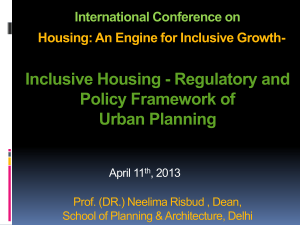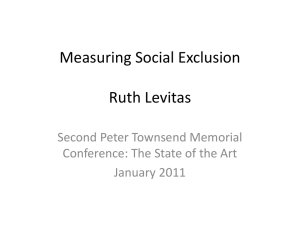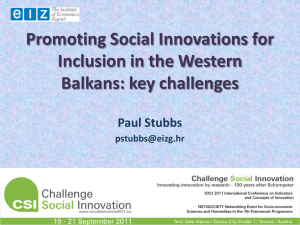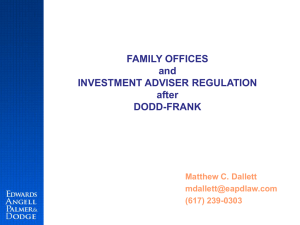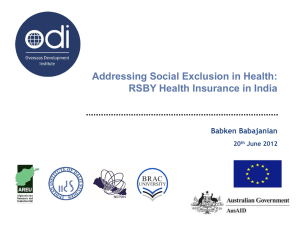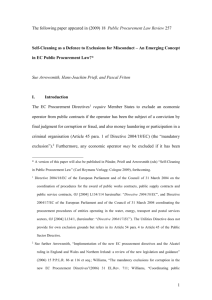Self-cleaning - Public Procurement Network
advertisement
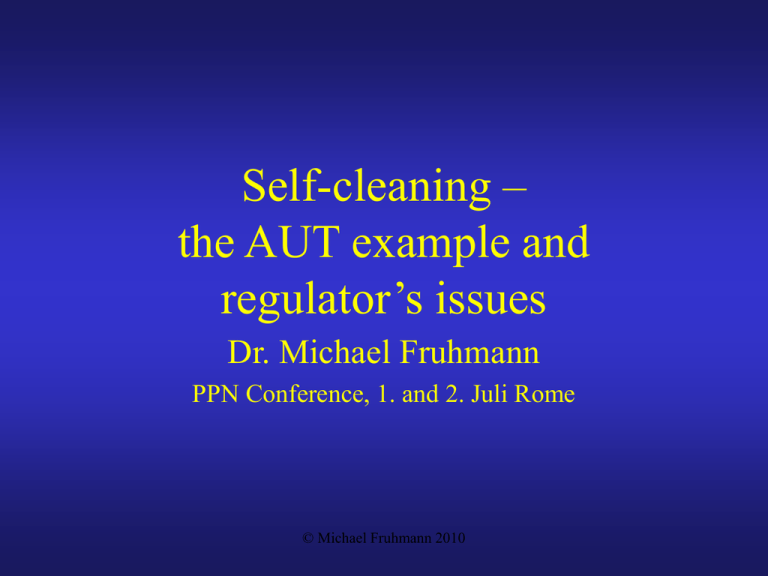
Self-cleaning – the AUT example and regulator’s issues Dr. Michael Fruhmann PPN Conference, 1. and 2. Juli Rome © Michael Fruhmann 2010 preliminary remarks • AUT Statement for Council minutes regarding 2004/18/EC and 2009/81/EC: “Austria considers that the conditions which, under the second subparagraph of Article 46 (1), the Member States are to specify, in accordance with their national law and having regard for Community law, for the purpose of implementing Article 46 (1), may include the conditions whereby an economic operator may prove that he has put a stop to the situation which gave rise to such a conviction. If an economic operator so proves, the contracting authority is not obliged to exclude him as a candidate or tenderer.” © Michael Fruhmann 2010 AUT system AUT regulatory approach to Art. 45: • Constitutional requirement: “conviction of a person/company may not lead to the exclusion for an undetermined time nor would it be admissible to exclude persons/companies without giving them the possibility to prove their reliability” © Michael Fruhmann 2010 Self cleaning in AUT PP Law AUT approach to Art. 45 – national level: • all reasons listed in Art. 45 of 2004/18/EC lead to mandatory exclusion • derogation from exclusion for overriding reasons in the general interest possible (but very restrictive interpretation) • self-cleaning possible and mandatory (CA has to consider the arguments) • decision on case-by-case basis by CA © Michael Fruhmann 2010 AUT basic procedural features • CA decides (exclusion and selfcleaning) on a case by case basis (not for a given time!) • system “covers” natural and legal persons © Michael Fruhmann 2010 AUT basic procedural features II AUT system of self cleaning § 73 FPA: • if CA becomes aware of reasons to exclude a company FPA requires company be provided opportunity to present evidence that all necessary measures have been taken that situation which has led to conviction will not occur again (to prevent exclusion) • up to company to provide information • all evidence must be taken into account by CA • decision of CA, if it deems evidence is sufficient © Michael Fruhmann 2010 Exclusion + self-cleaning in EU Law Exclusion: see Art. 7 (1) b 2009/52/EC (Dir. on minimum standards on sanctions and measures against employers of illegally staying third-country nationals) „exclusion for up to 5 years” Self-cleaning: see Art. 133a (1) of Regulation implementing Financial Regulation for General Budget © Michael Fruhmann 2010 Self-cleaning and general legal requirements Mechanisms of self-cleaning must conform to basic legal principles/concepts namely: • • • • Proportionality Fair trial Equal treatment (new) Fundamental Rights: Freedom to conduct a business, Right to property © Michael Fruhmann 2010 Self-cleaning Regulator’s issues (most important, not exhaustive): • Personal scope of self-cleaning? • What “triggers” self-cleaning mechanism? • Exclusion for a given time or on a case-by-case basis? • Exclusion with/without additional punitive element (general/specific prevention)? • Limitation of arguments/possibilities for selfcleaning? • Who decides on the basis of which criteria about exclusion? © Michael Fruhmann 2010 Personal scope of self-cleaning mechanism – criminal liability? 2 basic possibilities: 1. only natural persons 2. natural and legal persons if 2 is chosen: question how to deal with mergers/demergers, Art. 50 Charta (“Right not to be tried or punished twice in criminal proceedings for the same criminal offence” esp. in EU context - different MS), same offense – “double” measures obligatory (company and management)? © Michael Fruhmann 2010 What triggers self-cleaning mechanism? 2 basic possibilities as precondition: 1. conviction by (final) judgement (procedural issues: court/tribunal, Art. 6 ECHR – civil/criminal issue) and/or 2. “proof” by CA: “quality” of proof (suspicion enough)? – by any means/to the satisfaction of CA?) © Michael Fruhmann 2010 What triggers self-cleaning mechanism? Should be “and” because mechanism should apply to both possibilities of exclusion! “proof” – must be evidence based; suspicion as such not sufficient (see ECJ in C-213/07, Michaniki) © Michael Fruhmann 2010 What triggers self-cleaning mechanism? According to regulators choice: “plea bargaining” will be treated differently! no conviction (see BAE, Daimler) but maybe “proof” for misbehaviour (e.g. official statements, witness, protocols, money transactions …) © Michael Fruhmann 2010 What triggers self-cleaning mechanism? Follow-up: “who decides” on the exclusion? • • • (theoretically) law itself (issue: remedies “against” the law?) judge (together with judgement concerning offence; link to specific procurement procedure?) CA (following a judgement or on its own) © Michael Fruhmann 2010 Exclusion for a given time or on a case-by-case basis? Regulator’s issues - time limit : • fixed (one general time limit for all cases): not permissible (proportionality problem) • (range) min. – max.: possible but must vary according to the ground for excl. in question because time limit must be proportionate – see ECJ + Art. 49 Charta “proportionality” of punishment? (“Severity of penalties must not be disproportionate to the criminal offence”) © Michael Fruhmann 2010 Exclusion for a given time or on a case-by-case basis? II Regulator’s issues - time limit : • set in advance (by law, …), for ex. lists with duration for specific excl. grounds (poss. problem proportionality) or • set by judge/CA on a case by case basis (poss. problem of equal treatment – same duration for same offense) © Michael Fruhmann 2010 Exclusion with/without additional punitive element? Regulator’s issues: • if (additional) punitive element (for general/specific preventive reasons) is introduced, Art. 49 Charta must be taken into consideration (“proportionality” of punishment; “Severity of penalties must not be disproportionate to the criminal offence”) © Michael Fruhmann 2010 Limitation of measures? A priori exclusion/prohibition of certain selfcleaning measures (or of self-cleaning mechanism as such)? not possible! – principle of proportionality, Art. 47 Charta (“Right to an effective remedy”), Art. 48 (“Right of defence”), ECJ C-455/08 (“guarantee of effective review”) © Michael Fruhmann 2010 Who decides on the basis of which criteria about exclusion? 2 basic options possible: • decision taken by judge or CA decision must be open to review: Remedies Directive 89/665/EEC + 92/13/EC and Art. 47 Charta “Right to an effective remedy and to a fair trial” ( “Everyone whose rights and freedoms guaranteed by the law of the Union are violated has the right to an effective remedy before a tribunal …” all arguments put forward must be taken into consideration © Michael Fruhmann 2010 Self-cleaning in EU/international context Problems: • “mutual recognition” of (accepted) self cleaning measures taken in another MS • different regimes/standards (for ex.: liability of legal persons) • cross border access to data + comparable data (contents of judicial records vary) © Michael Fruhmann 2010 Self-cleaning in EU/international context Possible solutions: • eCERTIS (testing phase) • VCD – virtual company dossier (future) © Michael Fruhmann 2010 Thank you for your attention! Contact: Dr. Michael Fruhmann, Federal Chancellery, Constitutional Service, Republic of Austria michael.fruhmann@bka.gv.at © Michael Fruhmann 2010
